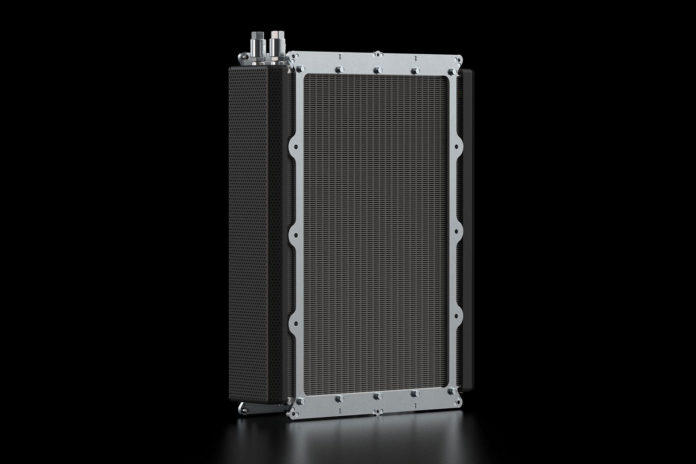The US-based startup HyPoint has teamed up with BASF New Business GmbH (BNB), a subsidiary of the chemical company BASF, to develop and test a new high-performance fuel cell membrane for use in its hydrogen fuel cell system.
The new membrane-electrode assembly (MEA) technology is expected to significantly improve the performance of HyPoint’s turbo air-cooled high-temperature proton-exchange membrane (HTPEM) fuel cell system.
BASF has been developing proton-conducting membranes, which are a key component of hydrogen fuel cells, for more than 15 years under the brand name Caltec. During their operation, hydrogen and oxygen gases are located on both sides of the membrane, which is designed to only allow single, positively charged hydrogen protons to pass through. A platinum catalyst on the hydrogen side splits each H2 molecule into two protons and two electrons. Protons pass through the membrane to the oxygen side, meet the electrons that have passed through the electrical circuit, and ensure current flow. Then the electrons, protons, and oxygen combine on the other side to create water.
The new proton-conducting membrane is capable of working at higher temperatures and pressures than before, with stronger mechanical properties to boot. HyPoint, for its part, is developing a unique turbo air-cooled fuel cell that differs from traditional designs precisely because it uses higher temperatures and pressures. In this way, protons pass through the membrane faster, producing more power.
The membrane’s enhanced mechanical properties, together with an advanced MEA design with gas diffusion electrodes, will significantly reduce the MEA’s weight while increasing its durability. Thanks to this, the new high-performance fuel cell system is expected to achieve more than 3,000 W/kg, an increase of at least 50% over the current system. Moreover, the new рrоtоn-соnduсtіng mеmbrаnе allows operation at temperatures between 120°C and 180°C, enabling a high tolerance to impurities while simplifying temperature and water management.
“BASF has substantial experience in the manufacture and development of HTPEMs, MEAs, as well as the necessary chemicals and compositions for hydrogen fuel cells,” said Dr. Alex Ivanenko, founder and CEO of HyPoint. “Our collaboration will yield next-generation membranes and membrane-electrode assemblies that result in a significant improvement to our system’s specific power, durability, and operational temperature range. Together, these will satisfy the requirements of the air transportation market, including narrow-body aircraft. It will also enable us to increase our production volume to meet customer demand and continue to expand capacity.”
The company says it will be proven and become available to customers in mid-2024.
